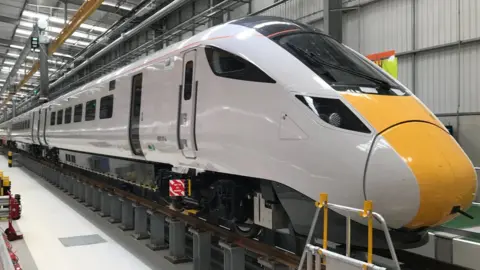Put ditched electric rail £430m into Welsh transport, say MPs
 BBC
BBCSavings from cancelling rail electrification between Cardiff and Swansea should be spent on Welsh transport improvements, MPs have said.
The Welsh Affairs Committee report says UK ministers have saved "at least £430m" by ditching the plans.
Committee chairman David Davies said "watered down" proposals had soured the introduction of the new trains.
The Department for Transport (DfT) said it had invested significantly on the rail network.
Bi-modal trains are now used on the route and are able to run on electric from London to Cardiff, then be powered by diesel beyond that point, after electrification beyond the Welsh capital was cancelled last July.
Referring to Welsh Government figures, the report says just 1.5% of the money UK ministers have spent on rail improvements has gone to Wales in recent years.
The report argues: "There is clearly a case for Wales, with approximately 5% of the UK population, to receive a greater share of spending on rail.
"While figures vary, it is undeniable that the government has saved at least £430m by not electrifying the line between Cardiff and Swansea.
"In our view, there is a strong case for using this money for cost-effective transport projects in Wales."
Mr Davies, Conservative MP for Monmouth, said: "Wales cannot have the only stretch of the line not to be improved then see the money saved go towards Crossrail 2 or the Northern Powerhouse.
"The money saved must be spent here in Wales."
The report calls on UK ministers to "engage closely with the Welsh Government to identify and scope out cost-effective transport projects on which the money saved from the cancellation of electrification could be spent".
The report says rail investment concerns were "brought home to us" by the recent announcement by Virgin Media that it was cutting 800 jobs in Swansea by closing a call centre and centralising operations in Manchester.
Mr Davies added: "When HS2 will see the journey time from Manchester to London slashed to only one hour eight minutes, while Swansea to London will be two hours, 45 minutes, it comes as no surprise."
The MPs say they want assurances new processes will prevent a repeat of what they call the "Great Western Programme failures", that led up to the electrification U-turn, calling on ministers to review the effectiveness of rail investment procedures within 12 months.
The report also calls on UK and Welsh ministers to work with Network Rail to "explore the viability" of straightening the track between Cardiff and Swansea to allow trains to run at faster speeds, which could strengthen the case for electrification.
Swansea West Labour MP Geraint Davies, who sits on the committee, said: "We are desperately underfunded. We need to invest to build demand and to build a more prosperous system for the future."
Liz Saville Roberts, a Plaid Cymru member of the committee, added: "Having to rely on Westminster to upgrade our railways on our behalf clearly isn't working.
"Despite the clear need for investment in Wales, Welsh taxpayers' money is being used to fund England-only project like HS2 and Crossrail at the expense of our own railway infrastructure."
The DfT said it had invested in the "most significant upgrade" of the the rail network since Victorian times.
"Thanks to this investment passengers travelling to South Wales on the Great Western Mainline are already benefitting from modern faster trains with more space and better facilities like wi-fi," a spokesman added.
"We will respond to the report in due course."
